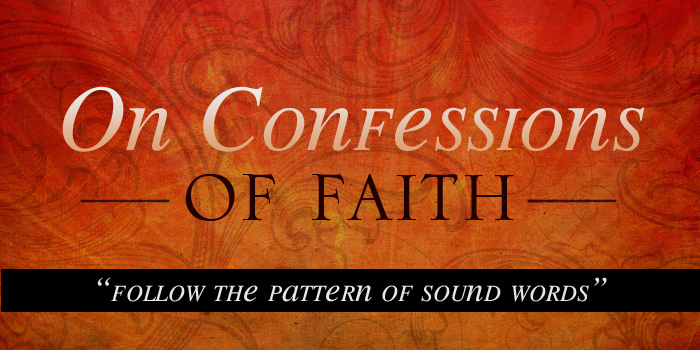Few church documents are more important that a church’s Confession of Faith (Statement of Faith is the more common contemporary moniker). Yet, at least in my experience, few documents are as little used as the congregation’s “pattern of sound words.”
In 2012 Carl Trueman did the entire church a great favor by publishing The Creedal Imperative. If you need any convincing of why a local church needs a confession, stop reading this post and go read his book. It’s that persuasive.
For me, as one already convinced of creedalism, the best part of the book was the final chapter where Trueman discusses why a confession of faith is useful. He gives eight reasons. Let me briefly mention them here, with any helpful elaboration, and then consider how a church can uses their confession.
8 REASONS WHY A CONFESSION OF FAITH IS USEFUL
- Delimits the power of the church.Church officers cannot just preach whatever they want. A confession “describes the message the church is to preach, and it limits the church’s power to what is contained in the document.”
- Offers succinct and thorough summaries of the faith.
- Allows for appropriate discrimination between members and office-bearers.“The bar for full communicant church membership is quite low: a simply but publicly coherent profession of faith in the line of Romans 10:9-10 is sufficient.” Yet, what biblical and theological competency is required of office-bearers? The simplest way to codify it would be to say they must fully subscribe (some denominations allow for exceptions) to the church’s confession of faith and be able to teach such truth.
- Reflects the ministerial authority of the church.
- Represents the maximum doctrinal competence that can be expected from a congregation. A confession “represents the church’s doctrinal and pedagogical aspirations.”
- Relativizes the present. Confessions are immune, in a good way, to the passing fads and tastes of the present. “Yes, the present is where we all live and breathe, eat and drink; but the creeds and confessions of the church connect us to the past and indicate that our identity is rooted in that past. This is in line with the thrust of biblical teaching.” Timothy was not to be innovative, rather he was to hold fast to the patter of sound words given to him by Paul.
- Helps to define one church in relation to another. A confession “serves transparency because it allows those outside to see what a particular church represents. . . . When someone visits the congregation, it is useful for congregants to be able to point them to a succinct summary of the church’s position on key doctrinal topics.
- Maintains corporate unity.A church is united insofar as it defines and agrees upon what is biblically true. A confession of faith is thus a document that fuels unity.
3 WAYS TO USE YOUR CHURCH’S CONFESSION
If a confession of faith is beneficial in all these ways, how then can a church use the confession in a way that brings doctrinal continuity and convictional harmony? Here are three ideas:
Use the confession in your church’s gathered worship.This is something I hope to continually do more of at IDC, but there is no reason why a church can’t regularly confess – through a corporate reading – some portion its confession of faith. It could be an article that has a direct link to the sermon, a clear expounding of a truth you are about to sing, or maybe it doesn’t have any clear link other than being a fantastic way to proclaim unity in Christ.
Use the confession in discipling relationships.A few of our elders have gone through the 1689 London Baptist Confession with different men in the church and been met with a great response. Many different churches I know of will use something like Grudem’s Christian Beliefs to train there members in systematic theology, but why not use the church’s confession of faith? A good and accurate confession is like a succinctly packed systematic. And all our members need resources succinctly packed with biblical truth.
Use the confession in elder and deacon meetings.We use the confession in all our office-bearer training, but we are growing in our consistent use of the documents in our actual meetings. It seems wise, for example, to consistently read a portion of the confession at your elders’ meeting and reflect together upon its truth. This further cements the doctrinal foundations in church leadership and helps fuel unified understanding of what the church confesses.
Confessions have a unique ability to promote clarity and unity in a local church. So why don’t you dust yours off and wield it to help build a vibrant witness to the world.



